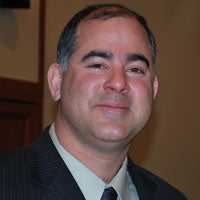Major David J. R. Frakt ’94, a U.S. Air Force JAG officer, discussed his ongoing representation of a detainee in the war on terror, in a February 23 panel discussion at HLS. The event was sponsored by the American Constitution Society, the National Security and Law Association and the Harvard Human Rights Journal.
Copies of Frakt’s article, “Closing Argument at Guantánamo: The Torture of Mohammed Jawad,” which will soon appear in the Human Rights Journal, were distributed to the audience.
In 2008, Frakt, who had served nearly ten years with the Air Force JAG Corps before becoming a professor at Western State University College of Law and director of its Criminal Law Practice Center, volunteered to defend Guantánamo prisoners in the military commission trials. He was assigned to represent Mohammed Jawad, a 17-year-old Afghani detained in 2002 for allegedly throwing a hand grenade at two American soldiers and their interpreter in Afghanistan.
Frakt recounted for the HLS audience how he bombarded the court with motions, including a successful motion to suppress two inculpatory statements obtained from Jawad at Bagram prison in Afghanistan, on the basis that they were produced by torture. He also filed a motion to dismiss a charge alleging that Jawad had committed a “war crime,” arguing that the grenade was a lawful weapon used in a war zone against a lawful target. In another motion, Frakt argued that the court had the authority to dismiss the case because torture had been used. The court agreed that it had the authority—an important ruling, with potentially far-reaching consequences—and that the government had not proven Jawad committed a war crime, but denied both motions to dismiss, saying other remedies were available.
Frakt’s article includes a detailed account of his argument on his motion to dismiss. New York Times columnist Anthony Lewis has described the argument as “a remarkable display of legal and moral courage.”
Jawad’s case, which Frakt believes will be dismissed, was put on hold when President Obama suspended the military commissions as part of an executive review of the process. In the meantime, Frakt and the ACLU have filed a habeas corpus petition for Jawad, in another attempt to release him.
“I actually dread now going to see Jawad,” said Frakt. His client, whom he believes to be innocent, told him, “Don’t come back and see me unless you have something, good news. I’m just tired of hearing, ‘Oh, we’re making progress.’” Frakt said to the HLS audience: “I can’t blame him.”
Frakt acknowledged that the case “has taken a toll, though, emotionally, just the frustration and the hopelessness of the situation…. It’s like butting your head against the wall.” But, he added, “it’s also been very rewarding to have a chance to defend the U.S. Constitution. That’s what I took an oath to do, when I joined the military, but I never actually did it until now.”
Also on the panel was Visiting Professor Lori Damrosch, who is the Henry L. Moses Professor of International Law and Organization at Columbia Law School.
– Lia Oppedisano
